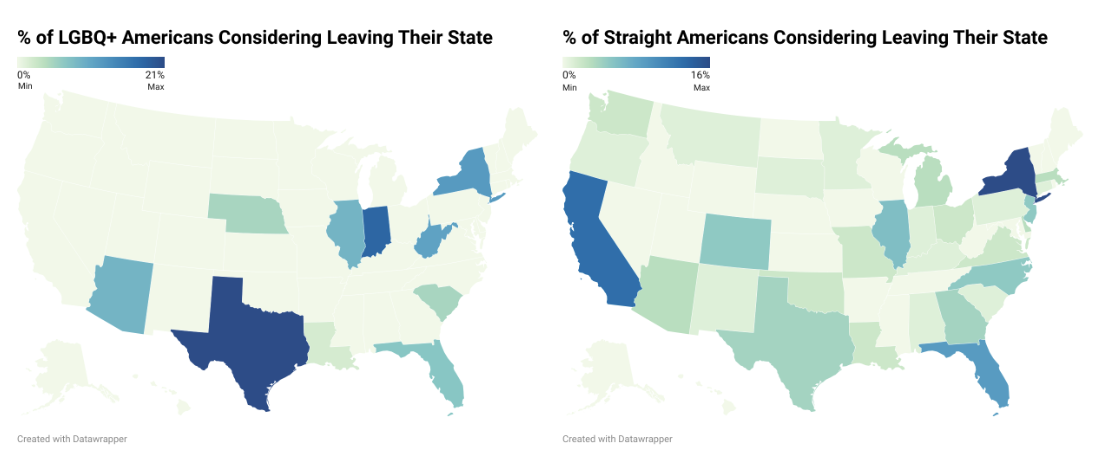NY Hush Money Trial Could Spell Trouble for Trump in November
May 30, 2024Voter attitudes as the trial comes to a close appear to decrease support for the former President, especially among undecided voters.

Written by: Melanie Phillips, Lily Stockbridge, and Grayson Wormser
As jurors deliberate in former President Donald Trump’s trial in New York for falsifying business records, here are the latest insights on American voters’ perspective of the case.
CURRENT STATE OF THE RACE
As of our latest poll conducted May 14-20, 2024, support for Biden and Trump was nearly split at 44% and 40% respectively. 13% of voters say they’re still undecided and 3% don’t plan to vote. With the race being this close, undecided voters are an essential segment of the electorate to understand as we head into November.
HUSH MONEY TRIAL NEGATIVELY IMPACTS SUPPORT FOR TRUMP
Given the unprecedented nature of this case, Citizen Data wanted to better understand how the trial of former President Trump affects his support and overall electability come November. While a majority of voters—59%—say the trial hasn’t affected their support for Trump, a significant minority (41%) report that it has. As shown below, among those individuals, 67% say that their support for Trump slightly or heavily decreased.

Some of the trial’s most predominant effects are with Americans still “unsure” about their vote choice for President in 2024. Among the 50% of undecided voters who say the trial impacts their support for Trump, 88% report the criminal charges decreasing their support for the former President while only 12% say it increases their support.

In comparison, it appears the trial has further engrained partisans into their corners. For Trump supporters, the trial has increased their net support by 13 points, while there was a 32 point decrease in net support for Trump among current Biden supporters. We observed similar trends when looking at voters’ self-identified party registration.
MOST VOTERS ARE UP TO DATE AND FOLLOWING TRIAL CLOSELY
After more than four weeks of testimony in the landmark trial and countless news stories reporting the ins and outs from the courtroom, a vast majority of voters report being up-to-date and aware of the trial. Perhaps not surprisingly, more than 9 in 10 voters (95%) say they’ve heard about the trial. Those with knowledge of the trial say they are actively seeking information about the trial’s progress, with two-thirds of voters seeking information at least once a week and nearly a quarter (23%) seeking info on the trial’s progress daily.
Baby Boomers (60-78) and the Silent Generation (79+) appear to be more engaged than younger generations, including Millennials (28-43) and Gen Z (18-27). Specifically, 45% of Boomers and the Silent Generation, on average, report seeking news about the trial daily compared to less than 10% of Millenials and 5% of Gen Z, on average.

These rates are slightly higher than we’ve seen in other surveys that asked similar questions earlier this month, suggesting an increase in the salience of the trial as it comes to a close (1).
VOTERS SPLIT ON WHETHER TRIAL IS FAIR
Voters are evenly divided on their views that Trump will receive a fair trial in the hush money case. 4 in 10 Americans (41%) think Trump will receive a fair trial while the same proportion (41%) believe he will not. Nearly 1 in 5 (19%), however, are still undecided about the fairness of the trial.

Not surprisingly, these differences can mainly be attributed to partisanship. Republicans are mostly likely to believe (71%) that Trump will not receive a fair trial, while 67% of Democrats believe the trial will be fair. However, self-identified Independents are more varied, with 45% believing Trump will not receive a fair trial with only 33% believing he will.
Interestingly, nearly a third (30%) of undecided voters—88% of whom report that the trial decreases their support for Trump—are unsure if he will receive a fair trial.
THE KEY TAKEAWAY
Despite being a little over five months out from the Presidential election, the effects of this New York criminal case could spell trouble for the former President in November. As the trial concludes, voters generally appear to be actively paying attention and seeking information about the trial, especially older generations who tend to watch more broadcast news than younger generations. Although undecided voters are unsure if Trump will receive a fair trial, their support for the former president appears to decrease fairly significantly amid ongoing coverage of the case.
All things considered, this data gives us a fascinating window into how voter attitudes might sway, especially if any other cases for which Trump is charged go to trial ahead of the election.
—————-
Interested in more on this topic or others? We’ll be continuing to track these key indicators to provide consistent, real-time feedback on the health of American democracy. Sign up for our latest insights here.
Methodology: Citizen Data sampled N = 1,001 registered voters during May 14-20, 2024 as a part of its monthly omnibus survey. The margin of error is +/- 3.1%. Results are weighted on Party ID, race, age, gender, and education.
ENDNOTES
(1) The rates are elevated from other research asking similar questions about how closely American voters have been following the trial. Compared to other surveys, our poll was fielded later in the month (May 14-20th) as the trial was further along and right after the testimonies of Stormy Daniels and Michael Cohen, suggesting an increase in salience as news and coverage of the topic increased.
Share this report
Stay up to date with our latest impact
A Closer Look at LGBTQ+ Americans
This powerful voting bloc is considering leaving their states at alarming rates– potentially causing important demographic shifts that may impact the 2024 election.
